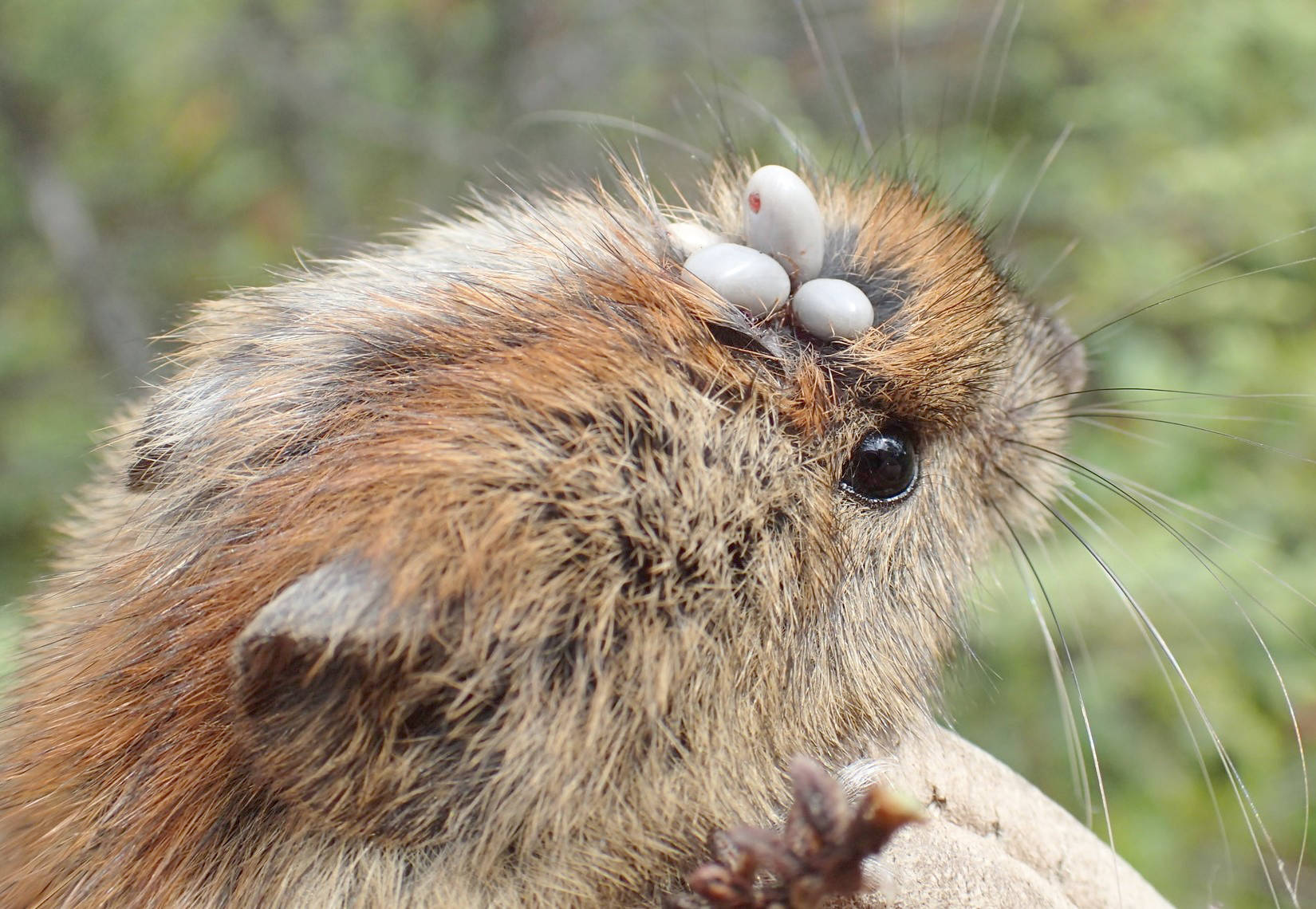While on a family vacation to Florida this spring we took a short walk through a lush, beautiful forest in Faver-Dykes State Park near Pellicer Creek. We had a splendid time until we returned to camp and found numerous ticks on ourselves. After that experience, my family was disinclined to go hiking while in Florida.
One of the things I appreciate about living in Alaska is that we do not have to worry about ticks or tick-borne diseases. Personally, I would much rather deal with bears, moose and mosquitoes than have to check all over for ticks after every walk in the woods. The prospect of contracting a potentially lifelong tick-borne disease scares me more than the risk of getting into trouble with a bear or a moose.
Ticks have been in Alaska for a long time, though. We know of seven species that are believed to be native to Alaska.
These include the vole tick, which feeds mostly on voles and squirrels; the hare tick, whose hosts are hares and rabbits; the raccoon tick, a parasite of raccoons and other mammalian predators; and four species of ticks that specialize on birds.
By far the most commonly encountered tick by members of the public in Alaska is the vole tick. Mostly found on voles and squirrels, they have also been collected from dogs, cats, ermine and humans.
Vole ticks can serve as vectors for various diseases including Lyme disease, but so far there is no record of a human contracting a tick-borne illness in Alaska.
Increasingly, multiple species of ticks from well outside of Alaska are showing up here on pets and people. Among these, the most commonly reported species is the American dog tick, which regularly arrives on dogs traveling up from the Lower 48.
The lone star tick, rocky mountain wood tick, deer tick, Pacific coast tick and even an iguana tick have also come here on people or pets from other parts of North America. One Old World species, the sheep tick, has been found in two instances on dogs that had traveled to Alaska from Europe.
Only one exotic species, the brown dog tick, is known to be reproducing in Alaska. A pest of dog kennels worldwide that can transmit many canine diseases, this tropical tick is unusual because it can complete its entire life cycle indoors.
The brown dog tick has now been documented in multiple locations in Alaska, presumably reproducing in kennels and similar situations.
It is a widely held misconception that Alaska’s cold climate prevents ticks from becoming established here. While the cold certainly excludes some southern species of ticks, there are cold-hardy ticks that should be able to survive outdoors in at least southern Alaska.
The American dog tick and the deer tick, both important vectors of diseases, may be able to persist in southern Alaska if given the opportunity.
It is now expected that the winter tick, a cold-hardy parasite of moose, elk and deer, will soon be present in Alaska. This species has been gradually expanding its range to the north and west in the Northwest Territories and the Yukon.
Winter ticks can reach high densities, with up to 40,000 to 90,000 ticks per moose, causing blood loss, hair loss, and even death of moose in other parts of North America.
There is no obvious reason why the sheep tick, which lives at high latitudes in Norway and Sweden and parasitizes a wide range of mammals, would not thrive in Alaska if it was introduced here.
I compared climate data from the Kenai Municipal Airport to the known climate tolerance of the sheep tick and found that there has not been a time since the mid-1990s when winters would have been harsh enough to greatly reduce populations of this species.
An animal easily mistaken for a tick is the sheep ked, a ticklike, wingless fly that parasitizes sheep. In Alaska, sheep keds have been collected from Dall sheep.
We do not know whether sheep keds are native to Alaska or have been brought to our area on domestic sheep. This is a question that could potentially be resolved by studying the genetics of sheep keds.
If you find a tick or a ked on yourself, a pet, wildlife or anywhere else in Alaska, I encourage you to send specimens to the Alaska Submit-A-Tick Program at https://dec.alaska.gov/eh/vet/ticks/submit-a-tick. The public, veterinarians and biologists are welcome to submit tick specimens.
A goal of the Submit-A-Tick Program is to develop ways to limit the spread of ticks into Alaska by learning more about how they are arriving here. I consider this a worthy cause.
I do not want Alaska to become like the Eastern United States, where checking yourself for disease-carrying ticks is a way of life for anyone spending time in the woods.
I will conclude with some good news. Dr. Micah Hahn at the University of Alaska Anchorage, whose team has been surveying for ticks in Southcentral Alaska this summer, reported finding exotic ticks at neither Hidden Lake Campground on the Kenai National Wildlife Refuge nor at Centennial Campground in Soldotna.
So far they have looked through samples collected from May through June 2019. Samples from later this summer remain to be processed.
For questions about ticks in Alaska, contact the Submit-A-Tick Program at alaskaticks@alaska.edu.
Matt Bowser serves as Entomologist at Kenai National Wildlife Refuge. Find more Refuge Notebook articles (1999–present) at https://www.fws.gov/refuge/Kenai/community/refuge_notebook.html.


